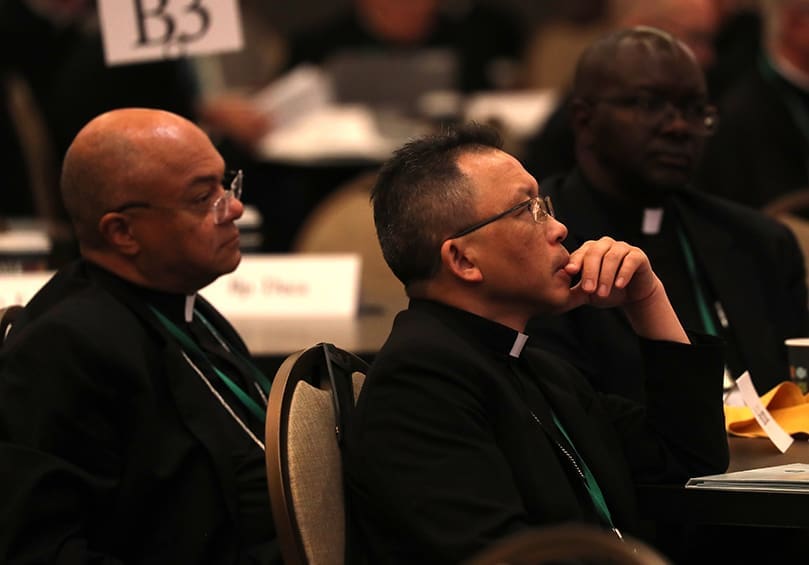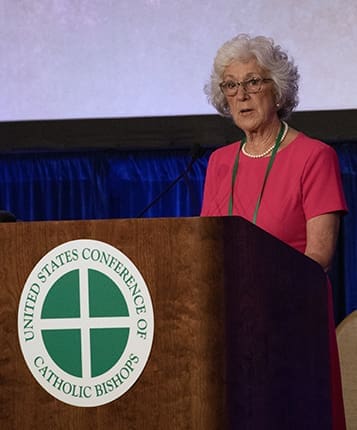 OSV News photo/Bob Roller
OSV News photo/Bob RollerLouisville
US bishops discuss anti-poverty arm, groundbreaking proposals at spring meeting
By PETER JESSERER SMITH, OSV News | Published June 17, 2024
LOUISVILLE, Ky. (OSV News)–Gathered in Louisville for their spring plenary assembly, the U.S. bishops’ June 12-14 meeting saw a mix of important matters discussed–with some unexpected twists and moments of robust discussion–starting with how the bishops would continue to address the scourge of poverty in the U.S. and ending with a view to the future for the National Eucharistic Revival.
The first day of the bishops’ public session June 13 was split between the morning executive session and an afternoon public session. Behind closed doors, the bishops discussed the future of the Catholic Campaign for Human Development, their domestic anti-poverty initiative, which has suffered in recent years from declining donations and questions about grant-making decisions that had depleted its funding reserves.
In a June 13 press conference, Archbishop Timothy P. Broglio of the U.S. Archdiocese for Military Services USA, the president of the U.S. Conference of Catholic Bishops, told reporters that no decisions had been made yet. But he emphasized the bishops remain committed “to the vital work of fighting poverty in this country” and that the subcommittee responsible for overseeing CCHD would review the bishops’ input and act on that advice.
In a shift from previous assemblies, Cardinal Christophe Pierre, the papal ambassador to the U.S., did not focus his address to the bishops on the process of becoming a synodal church–the topic of the global Synod on Synodality in Rome–but instead focused on the National Eucharistic Revival, affirming the central importance of the bishops’ endeavor. He urged them to experience this revival as bishops, and emphasized Pope Francis’ insight that eucharistic devotion is connected with the church’s mission of “washing the feet of wounded humanity.”
The U.S. bishops voted to send a message to Pope Francis, joining him in praying for peace in the world, calling for diplomatic solutions that affirm human fraternity, and thanking him for sending Cardinal Luis A. Tagle as his delegate to the National Eucharistic Congress in July.
Archbishop Broglio gave a presidential address that began with a reflection upon the American sacrifices to liberate Europe from Nazi domination that were made 80 years ago at D-Day on the blood-soaked beaches of Normandy, France, and affirmed many of the points in the bishops’ message. In particular, he focused on how various Catholic agencies and individuals were bringing the church’s witness to peace amid ongoing conflicts–many of which the rest of the world has otherwise forgotten, such as Syria and Haiti.
Over the course of both days, the bishops also heard about the ongoing progress of the Synod on Synodality, and that its second session this October will zero in on what a synodal church should look like. The bishops heard that becoming a synodal church was about creating a place of encounter in the church, where tensions could be fruitfully transformed for the sake of the church’s health and holiness.
Bishop Daniel E. Flores, who served last year as a president delegate of the synod assembly and a member of the synod’s preparatory commission, emphasized it would help bishops “to think together with our people about how to be about what we should be about, which is the concerns of Christ the Lord.”
The bishops of the Latin Church also voted to approve all their agenda items related to English translation texts for the Liturgy of the Hours and the Roman Missal–a process which the bishops’ chair of the Committee on Divine Worship, Bishop Steven J. Lopes of the Ordinariate of the Chair of St. Peter, said finally completed the work on the new English translation of the Liturgy of the Hours that the bishops began in 2012.
The U.S. bishops overwhelmingly voted June 14 to approve a pastoral framework for Indigenous Catholic ministry, which also included an apology for the church’s failures over the course of its history in North America “to nurture, strengthen, honor, recognize and appreciate those entrusted to our pastoral care.”
However, the bishops’ pastoral framework for youth and young adult ministry hit a snag that stunned the bishops and Bishop Robert E. Barron of Winona-Rochester, Minnesota–chair of the bishops’ Committee on Laity, Marriage, Family Life, and Youth–who had presented on it just the day before as a “watershed moment” in forming youth and young adults for “missionary discipleship” and “Christlike leadership in society.”
Despite overwhelming support from the bishops present, too many individual bishops had already left for their home dioceses by the June 14 morning vote, and the framework failed to meet the two-thirds threshold for passage by two votes.
It was an unexpected hiccup, as ultimately the youth and young adult framework was expected to pass once the absent bishops were polled.
The aspect of the bishops’ meeting that most resembled a real debate was a vigorous discussion June 14 over creating a national directory of instituted ministries. The bishops had a lively exchange regarding lay ministries and whether they should together consider the ministries of acolyte, lector and catechist–the former two which Pope Francis expanded to include women and the latter which he formally instituted–or start work on guidelines for the catechist, an ancient office in the church and now an instituted lay ministry. They also expressed concern about proper formation, but also about a kind of “professionalization” that would exclude faithful people from living this ministry–particularly those who had valuable experience from Latin American contexts.
Bishop Lopes suggested the bishops should continue by considering all three together, and work on clarifying their complementary roles in carrying out the local church’s mission, saying Pope Francis seemed to be inviting them to understand these ministries as not simply serving a liturgical function but encompassing a “larger reality” of lived discipleship.
Archbishop Alfred C. Hughes, archbishop emeritus of New Orleans, however, advocated an amendment to start some preliminary work on the ministry of catechist–making adjustments at a later date with respect to the ministry of acolyte and lector–that the bishops could examine at their meeting in November.
Speaking on behalf of the Committee on Evangelization and Catechesis, he cited the urgency of catechesis given the high rates of Catholic adults disaffiliating from the church. The committee’s amendment ultimately carried the day, and the bishops approved the national directory proposal.
The bishops had another robust discussion the day before, June 13, following the update on their mental health campaign, which included presentations on how Catholic Charities can help the bishops form a “trauma-aware church,” and the vital importance of parish engagement and accompaniment in this effort to save lives.

Suzanne Healy, chairwoman of the U.S. Conference of Catholic Bishops’ National Review Board,June 14 at the U.S. Conference of Catholic Bishops’ Spring Plenary Assembly in Louisville, Ky. OSV News photo/Bob Roller
The bishops’ exchange affirmed their view that ending the stigma surrounding mental health was not only good for the faithful, but also for clergy, allowing them to open up about their own mental health needs.
Bishop John P. Dolan of Phoenix applauded these efforts, saying they were “bringing people back into the framework of church through accompaniment.”
The bishops also voiced their unanimous approval for the plans of Bishop David L. Ricken of Green Bay, Wisconsin, to open a cause for the canonization of Adele Brise, a Belgian-born immigrant from the 19th-century, whose visions of the Virgin Mary Bishop Ricken had declared worthy of belief in 2010. The bishop suggested Brise provided a model for their evangelization and catechesis efforts.
Although the bishops’ public sessions had opened with matters that seemed routine, the June 14 session included presentations inviting the bishops to authorize groundbreaking efforts on combatting abuse and an urgent call to engage with lawmakers on immigration policy affecting religious workers from foreign countries.
Suzanne Healy, chair of the bishops’ National Review Board, introduced proposals toward combating sexual abuse, including the issuance of guidelines that would address the sexual or spiritual abuse of adults, a new John Jay College to study abuse allegations since 2011, and a 2027 national day of prayer as an act of restorative justice.
“You again have the opportunity to break ground and establish the foundation for the next evolution of safeguarding,” she said.
Bishop Mark J. Seitz of El Paso, Texas, chair of the bishops’ Committee on Migration, reported to the bishops that a foreign-born priest who applies for a green card has a 15-year wait–and current rules on the federal Temporary Religious Worker Visa Immigration program mean that priest would have to go back to another country every five years.
Bishops on the floor likewise expressed their concern about how confusing the rules were for religious workers to navigate. Bishop Seitz said a “partial fix” from the federal administration might shorten that time, but without Congress intervening, the situation is ultimately “simply not sustainable for our ministries.”
The bishops’ final agenda item June 14 was the matter of the National Eucharistic Congress. Bishop Andrew H. Cozzens of Crookston, Minnesota, board chair of the National Eucharistic Congress Inc., told the bishops that they expect a sold-out stadium of 50,000 people for the weekend of July 17-21 at the National Eucharistic Congress. He noted the strong participation of at least 50,000 people with the four National Eucharistic Pilgrimage routes that were halfway toward their destination of Indianapolis.
But he emphasized that their eye was already toward the future, from initiatives to invite Catholics to “consider walking one person back to the faith,” along with forming “Eucharistic missionaries,” and planning future national Eucharistic congresses, similar to what takes place in other countries.
“The hope is this will not be a one and done,” he said. With no questions from the body of bishops, he said, “See you all in Indianapolis!”